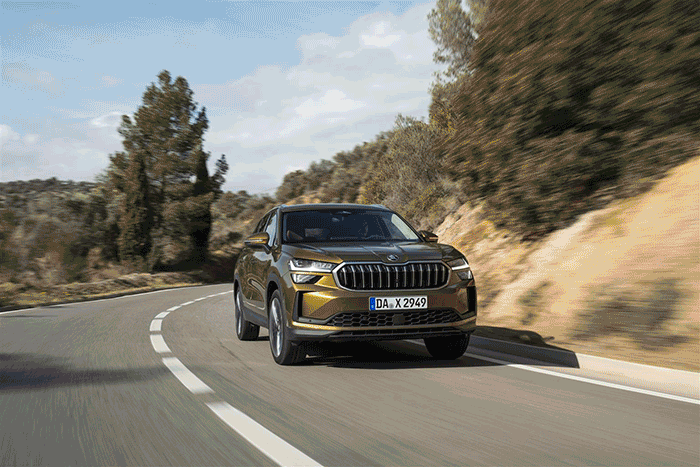 Skoda Auto presents the second generation Kodiaq, taking sustainability, spaciousness and safety to a new level. The SUV flagship of the Bohemian carmaker has increased in size and now features the first features of the Modern Style language.
Skoda Auto presents the second generation Kodiaq, taking sustainability, spaciousness and safety to a new level. The SUV flagship of the Bohemian carmaker has increased in size and now features the first features of the Modern Style language.
The new Kodiaq has modern infotainment systems, including an optional 13-inch touchscreen and head-up display system.
Skoda Smart Dial with touch controls and 10-inch Virtual Cockpit are standard. From mid-2024 the voice control system will be more advanced with the integration of ChatGPT’s intelligence-based chatbot.
The large Skoda SUV also adopts a new interior concept based on different Design Options. The five engines produce power from 110 kW (150 HP) to 150 kW (204 HP) and are always connected to a DSG automatic transmission. The range of electric powertrains now also includes a plug-in hybrid version with an electric range of over 100 km and a mild hybrid powertrain.
The two top engines are mated to standard all-wheel drive. The latest generations of Matrix LED lights with higher brightness and Dynamic Chassis Control (DCC Plus) system are also starting.
The second generation offers a new design, greater sustainability and new technology
On the outside, second-generation Matrix LED headlights and a grille with a horizontal light strip immediately catch the eye, while on the inside, recycled leather fabrics from an environmentally friendly tanning process highlight sustainability. In addition to the new model range and optional special Design Selection packages, the Kodiaq also offers a new interior concept. The infotainment display is now freestanding, with a screen width of up to 13 inches. A head-up display system is also available for the first time. The gear selector lever is now placed on the steering column, which gives the center console a very clean and elegant look, and adds extra space. Skoda Smart Dials is another brand new feature of the new Kodiaq: three rotary controls placed below the infotainment screen.
Combining haptic controls with a 32mm color display, they provide intuitive, easy and customizable access to various vehicle and infotainment features. By connecting the AI-based chatGPT to its voice assistant Laura, Skoda is improving the in-car experience of many customers and helping to make everyday life easier. The new vented phone case allows for inductive charging of two smartphones at the same time, providing 15 W of power.
It will start with a plug-in hybrid with an electric range of over 100 km
The new Kodiaq is available with two diesel and two petrol engines that deliver power from 110 kW (150 HP) to 150 kW (204 HP). A new addition to the lineup is the Kodiaq iV featuring a plug-in hybrid powertrain. It offers a system output of 150 kW (204 hp) and an electric range of over 100 km. Furthermore, the 1.5 TSI with 110 kW (150 hp) marks the debut of mild hybrid technology for the Kodiaq. The top-of-the-line 2.0 TSI with 150 kW (204 hp) and the 2.0 TDI with 142 kW (193 hp) come with all-wheel drive as standard. The engines of the new Kodiaq are always paired with a DSG automatic transmission.
























